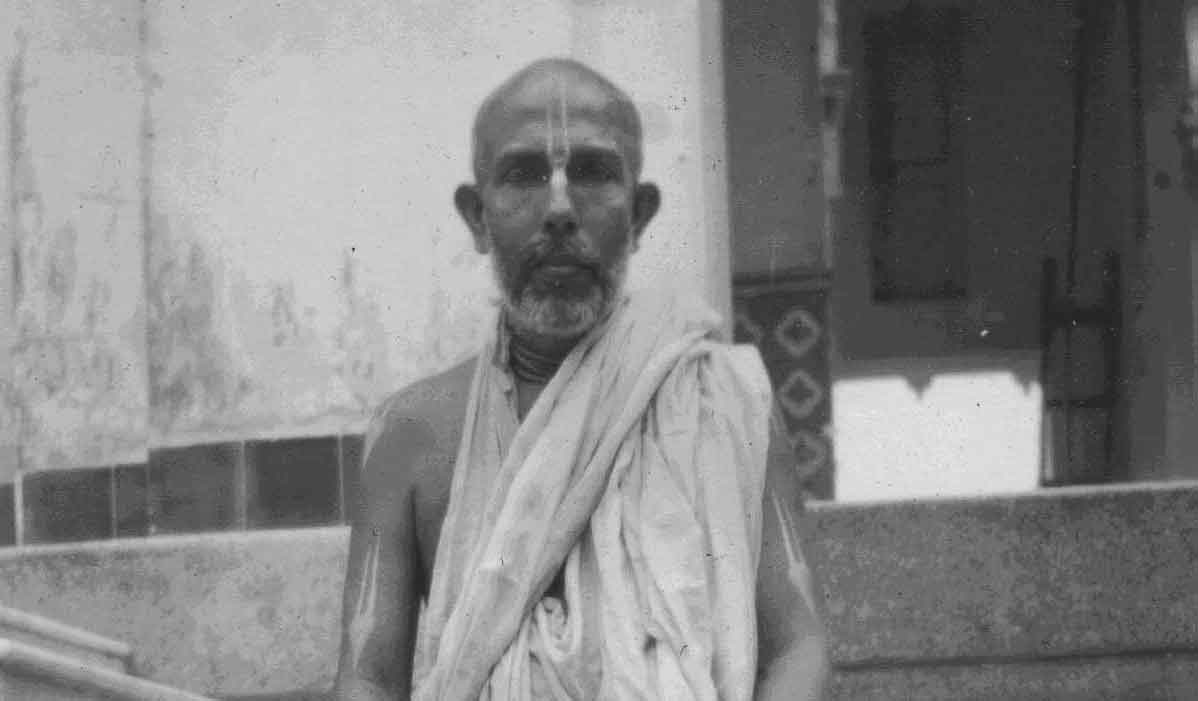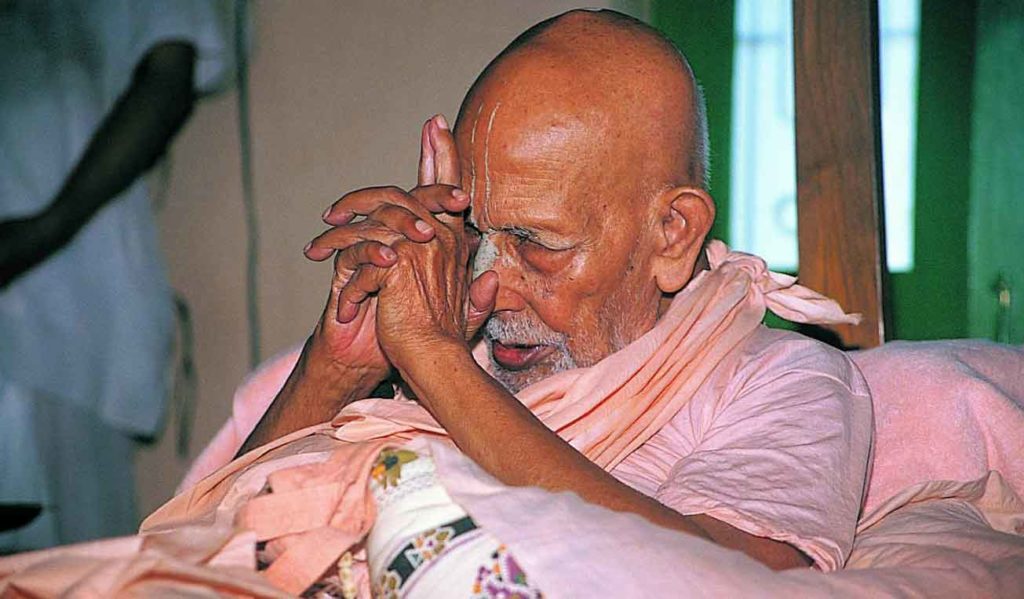Overview
In this article from Chapter 15 of ‘The Art of Sādhana,’ Śrīla Puri Gosvāmī discusses the qualities of a true disciple and the natural humility he feels when he is fully surrendered.
The word dīkṣā refers to the process of surrendering to a spiritual master. The genuine spiritual master is one who is most dear to the Supreme Lord, one who is His intimate associate. A person who takes shelter of such a spiritual master is recognised by Kṛṣṇa as one of His own. The Lord immediately bestows a transcendental body on such a surrendered soul and, in this body, the disciple has the good fortune to serve the divine form of the Lord.
The primary characteristic of a disciple who has received initiation and direction in the practice of worship from his spiritual master is viśrambha, an honest desire for faithful and loving service to the spiritual master, the Vaiṣṇavas and the Supreme Lord. The secondary characteristic is that he seeks to destroy all his sinful activities.
The divya-jñāna, the transcendental knowledge of sambandha, abhidheya, and prayojana, is received by the disciple as part of initiation. The self-revealed scriptures, the Vedas, are the supreme authority (pramāṇa) on spiritual subject matters. The scripture and the nine prameya (teachings) based on scripture are collectively called daśa-mūla, the ten basic elements of spiritual knowledge. The nine prameya consist of the seven aspects of relationships (sambandha) – Kṛṣṇa Himself, Kṛṣṇa’s energies, Kṛṣṇa’s divine mood (rasa), the soul, its bondage and its liberation, and the inconceivable oneness and difference of the Lord and the individual soul. To these seven are added abhidheya, bhakti, and prayojana, love of God.
Along with all of this knowledge comes an important side effect: the destruction of one’s sinful reactions. Thus the direct result of initiation is love for Kṛṣṇa. Mahāprabhu confirms this in the following statement to His own spiritual master:
kibā mantra dilā, gosāñi, kibā tāra bala
japite japite mantra karila pāgala
“What mantra have you given me, O Gurudeva! What powers does it possess? As I chant this mantra, I feel that it is turning me into a madman.” (Caitanya-caritāmṛta 1.7.81)
If one does not develop love for Kṛṣṇa nor feels any attachment to the chanting of the Holy Names after being initiated, but remains inclined to sinful activities, falling down from time to time, it is then clear that either knowingly or unknowingly, that person has committed terrible offences to the Lord, the guru or the Vaiṣṇavas. One should then think: “I have only made a pretence of surrendering myself. I have used my initiation simply as an excuse to engage in sense gratificatory activities.”
IGNORANCE MEANS REJECTING THE LORD
A lack of interest in the Supreme Lord Śrī Kṛṣṇa is the conditioned soul’s chief defect. The basis of all sin is ignorance, whose symptom is the rejection of Kṛṣṇa. The seed of all sin, i.e., the tendency to sin, is present in the flaw of ignorance. From there, sinful activity is inevitable.
Kṛṣṇa Dāsa Kavirāja Gosvāmī compares this deficiency in the conditioned jīvas to coming under the influence of a witch’s spell.
sei doṣe māyā-piśācī daṇḍa kare tāre
ādhyātmikādi tāpa-traya tāre jāri māre
kāma-krodhera dāsa hañā tāra lāthi khāya
bhramite bhramite yadi sādhu-vaidya pāya
tāṅra upadeśa-mantre piśācī palāya
kṛṣṇa-bhakti pāya, tabe kṛṣṇa-nikaṭa yāya
“For rejecting Kṛṣṇa, the witch of illusion punishes the jīva, causing him to suffer the three kinds of misery – ādhyātmika, ādhibhautika, and ādhidaivika. The unfortunate conditioned soul then becomes the slave of his desires and his frustrations, suffering their kicks and abuse. After wandering through the universe in this condition, if he somehow finds a saintly person to act as an exorcist, then through his powerful instructions, the witch’s mastery is overcome and she runs for her life. The fortunate individual then finds pure devotion to Kṛṣṇa and goes to Him.” (Caitanya-caritāmṛta 2.22.13-15)
The devotee then turns to Kṛṣṇa and prays as follows:
kāmādīnāṁ kati na katidhā pālitā durnideśās
teṣāṁ jātā mayi na karuṇā na trapā nopaśāntiḥ
utsṛjyaitān atha yadu-pate sāmprataṁ labdha-buddhis
tvām āyātaḥ śaraṇam abhayaṁ māṁ niyuṅkṣvātma-dāsye
“I carried out so many evil orders of my wicked masters – lust, anger, greed, bewilderment, intoxication, and envy – that I have lost count. Yet, despite my faithful service, these masters have never taken pity on me. I am so shameless that the faintest desire for devotional service has never once manifested in my heart. O Lord of the Yadus, today I have finally come to my senses and I throw off my shackles to take shelter of Your fearless lotus feet; please engage me in Your personal service.” (Bhakti-rasāmṭta-sindhu 3.2.25, Caitanya-caritāmṛta 2.22.16)
PURITY’S CHARACTERISTICS
Parikṣit Mahārāja made the following significant statement about how one can recognise purity in a devotee’s character: “The person whose self has been washed clean never abandons Kṛṣṇa’s lotus feet (hautātmā puruṣaḥ kṛṣṇa- pāda-mūlaṁ na muñcati – Śrīmad Bhāgavatam 2.8.6).”
Viśvanātha further clarifies:
“The sign of a pure heart is the inability to abandon the service to Kṛṣṇa’s lotus feet” (mat-pāda-sevā-tyāgāsamārthyam eva śuddha-cittatva-cihnam). If somehow or other one sees that such a devotee is affected by lust or anger, such incidental characteristics should be considered like the bite of a snake with broken teeth; an insignificant setback which does not have long-term effects on the devotee’s devotional life (ataḥ kvacit kāma-krodhādi-sattve’pi utkhāta-daṁṣṭroraga-daṁśavat tasyākiṁcit karatvaṁ jñeyam). There is no poison in a snake’s broken fangs, so its bite is not considered a significant problem, even though it appears very dangerous to the uninformed observer. Similarly, lust, anger and greed may cause some disturbance in a devotee’s mind, but do not result in his mind being permanently contaminated.”
The Lord accepts the offerings of those devotees of purified mind. Other than the association of such pure devotees, the jīva has no other hope of attaining any value of significance in life.
One should not think, however, that all one has to do is to sit and listen to the spiritual master’s instructions. One has to act according to those instructions. If a disciple does not take up the devotional practices or sādhana recommended by the guru then how can he expect to achieve spiritual perfection?
In the Caitanya-caritāmṛta, the Lord says that, on receiving initiation from the spiritual master, one should worship Kṛṣṇa and serve the guru. Then one becomes free from the control of maya and attains Kṛṣṇa’s lotus feet. (Caitanya-caritāmṛta 2.22.25)
tāte kṛṣṇa bhaje, kare gurura sevana
māyā-jāla chuṭe, pāya kṛṣṇera caraṇa
In his commentary to the above-mentioned verse, Śrīla Prabhupāda Bhaktisiddhānta Sarasvatī Ṭhākura writes: “It is through a combination of bhajana and service to the spiritual master that one becomes free of māyā’s net and attains Kṛṣṇa’s lotus feet.”
Śrīla Prabhupāda also says,
“Our eternal spiritual identity is to be the dust of the lotus feet of Rūpa and Raghunātha.” Therefore, we have no other duty in life than to follow their example. He has further affirmed, “Without the performance of hari-nāma-saṅkīrtana, no other practices of bhakti-yoga such as residence in Mathurā or association with devotees are complete. However, even if I only engage in hari-nāma-saṅkīrtana, I will win all the fruits of residence in Mathurā, associating with devotees, serving the deity in loving faith, and listening to the Bhāgavatam. Simply through hari-nāma-saṅkīrtana, all perfections come to the jīva.”
Our spiritual master instructed us to chant 100,000 Names daily without offence, keeping our objectives clear. If we cannot follow this instruction, how can we expect to become free of all the contamination in our hearts? As stated by Śrī Caitanya Mahāprabhu, the performance of hari-nāma–saṅkīrtana is glorious in seven ways. It cleans the mirror of the heart (o-darpaṇa-mārjanam); it extinguishes the conflagration of material life (bhava-mahā-dāvāgni-nirvāpaṇaṁ); it distributes the cooling moon rays of auspiciousness (śreyaḥ-kairava-candrikā-vitaraṇaṁ); it is the life of transcendental knowledge, which is like its consort (vidyā-vadhū-jīvanam), it increases the ocean of divine bliss (ānandāmbudhi-vardhanaṁ); at every step, it gives a taste of the full ambrosia for which we have always been anxious (prati-padaṁ pūrṇāmṛtāsvādanaṁ); and it bathes the entire self in divine ecstasy (sarvātma-snapanaṁ). Mahāprabhu Himself repeatedly stated that there was no worship superior to the worship of the Holy Names. “All will attain perfection through the chanting of the Holy Names. Chant these Names constantly; I give you no other rules.” (Caitanya-bhāgavata 2.23.78)
Do we have any hope of attaining the supreme good if we ignore these instructions of the Lord and the spiritual master?
THE SERVANT’S VOW OF SERVICE
The devotee who desires to reach the level of niṣṭhā should make the following vow:
“According to the instruction of my spiritual master, I must absolutely complete chanting a fixed number of Names on my japa beads daily, as well as daily offer a fixed number of obeisances to the devotees and to the deity form of the Lord. I absolutely must perform my prescribed service at certain fixed times of the day. I must observe the fortnightly Ekādaśī fast. Upon rising in the brahma-muhūrta period, before dawn, I shall remember Kṛṣṇa and His devotees’ lotus feet in a particular way, then bathe. After this, I will sit down and meditate on the mantra into which my guru has initiated me. Then I will perform pūjā to the deity, study the devotional scriptures, and sing the hymns written by the great authorities. All these things I shall do every day without fail.
“I shall never welcome any thoughts other than thoughts of Kṛṣṇa; I shall absolutely give up all useless controversy and gossip. Every day, I shall unfailingly hear the spiritual instructions of my guru and advanced devotees and then discuss those topics with my godbrothers, rather than wasting time in fruitless conversations. I will not allow any of the valuable time given to me in this human form of life to be wasted by giving way to sloth and laziness. I will therefore not lose a moment to sleep that is not absolutely necessary for maintaining my body, but will employ every moment in a way that is spiritually profitable.
“I will be very careful to avoid the association of anyone who is overly attached to material enjoyments, or of the wives of other men, or of womanising men. Indeed, I shall avoid the company of anyone who is not a devotee of Kṛṣṇa, for it is said:
asat–saṅga–tyāga ei vaiṣṇava–ācāra
strī-saṅgī eka asādhu kṛṣṇābhakta āra
‘The essence of Vaiṣṇava behavior is to give up the association of the unsaintly. By unsaintly it is meant those who are attached to the opposite sex and those who are non-devotees.’ (Caitanya-caritāmṛta 2.12.195)
“Every day without fail I will complete chanting the Maha-mantra consisting of 16 names and 32 syllables a fixed number of times. Even when not chanting on my beads, I will constantly repeat these names without counting. Without completing my japa and chanting my īṣṭa-mantra, I will not even touch water, what to speak of taking food. My spiritual master who has initiated me with the īṣṭa-mantra is my only true friend in both this world and the next. If I cannot win his pleasure, then all my spiritual practices are for nought. Through his mercy I can win the mercy of the Supreme Lord. If I displease him I have no other recourse. If Kṛṣṇa is displeased with me, my spiritual master can intervene on my behalf, but if the spiritual master is angry or dissatisfied with my actions, then all my spiritual practices are as worthless as oblations of clarified butter poured on the remains of a fire sacrifice. The service of my spiritual master’s lotus feet is the real treasure of my spiritual life. Any spiritual practice performed independently of him is without value. Whatever hearing or chanting I engage in should be done for the pleasure of my spiritual master alone. I should always meditate on these words sung by Narottama Dāsa:
sei vrata, sei tapa sei mora mantra japa
sei mora dharama karama
‘The feet of Śrī Rūpa Mañjarī are my real wealth. They are the object of my vows. They are the goal of my austerities and penances, they are the goal of my mantra and my japa. They are the purpose of my religious observances, my every activity.’ (Prārthanā 8)
“If my guru rebukes or criticises me, I should take it as a great fortune. I should remember that whatever spiritual practice I engage in, all is being done for his pleasure. I should give this consideration pride of place in my consciousness, remembering Sārvabhauma’s words to Mahāprabhu: ājñā gurūṇāṁ hy avicāraṇīyā: ‘The orders of our gurus are never to be debated.’ (Caitanya-caritāmṛta 2.10.145)
“I pray that my intelligence never becomes so contaminated that I criticise the words of my spiritual master. May such a wicked mentality never manifest in my heart, not even in my dreams. Any arrangement he makes for me is for my ultimate good. I pray that I never consider him to be an ordinary mortal by entertaining negative judgements of his words or actions. I will always remain on my guard against such a disaster.
“Because the guru is affectionate towards his disciples, if I approach him with my doubts, he will lay those doubts to rest with his answers. May I never forget for even a moment that my spiritual master is the source of all auspiciousness. The Supreme Lord has taken the form of my guru in order to give me the mercy of initiation and spiritual teaching. May I never forget at any time this manifestation of compassion of the Lord’s revealed form as the guru. The duty of the disciple is to always seek the pleasure of his spiritual master, whose only purpose is to carry out the orders of the Supreme Lord Śrī Caitanya Mahāprabhu on this earth. I should always consider the servants of my guru to be worthy of my respect. Whoever is dear to my guru is dear to me.
“If I can keep on doing my devotional service with this attitude of unswerving, constant faith in my spiritual master, then through his satisfaction I will quickly become qualified for all perfections. My spiritual master has assured me that through the Holy Name I can attain all perfection, therefore, I will faithfully chant the Holy Names without committing offences, while always making a determined effort to strictly follow his orders. On the strength of the Holy Names in which my guru has instructed me, I will become eligible for the treasure of rāgānuga-bhakti and for the great fortune to taste the sweet flavours of the most elevated spiritual relations, never given prior to the appearance of Śrī Caitanya Mahāprabhu.”
THE DEVOTEE’S PRAYER
Śrī Guru’s mercy is everything – guru-kṛpā hi kevalam. Therefore one should pray as follows:
“I am most fallen and useless, O Lord. May my spiritual master be pleased with me. May he give me the spiritual strength to follow his directions. May all the obstacles in my worship of the Lord be removed so that at the end of my sojourn in this world, I may sit alone far from the hustle and bustle of the material world, and with a steady mind, chant the Holy Names with feeling. May the Lord be merciful and allow me to give up my last breath in this way. Knowingly or unknowingly I have committed so many offences to His lotus feet, and even now I continue to commit such offences. O Lord, please forgive all such offences and give me a place at Your lotus feet. Make my life complete by allowing me to associate with those who are dear to You.
“For so long I have simply made a pretence of being initiated. In fact, I have not done that which a surrendered soul should do; I have not strictly followed my spiritual master’s instructions, thus I have not made even a little advancement in spiritual life. All the contamination in my heart prior to initiation are still there today, so how is there any hope of my attaining the divine realisation which is said to be the real sign of initiation? Like a lump of iron my heart is without feelings. Even though I chant the Holy Names, it does not melt. Thus I am thinking,
aparādha phale mama citta bhelā vajra-sama
tuwa nāme nā labhe vikāra
“Due to offences, my heart has become as hard as a thunderbolt. Therefore no ecstatic transformations take place when I chant your name.” (Bhaktivinoda Ṭhākura)
tabe jāni tāhe aparādha āchaye pracura
kṛṣṇa-nāma bīja tāhe nā haya aṅkura
“Thus I know I have committed so many offences to the Holy Name; for though I have planted the seed of the Name, no creeper of love has sprouted.” (Caitanya-caritāmṛta 1.8.29)
“O Gurudeva! Now in the evening of my life, I have become so forlorn and hopeless. O Lord! O You who see no fault in anyone! Be generous to me and give me your mercy. Help me to be free of all offences so I develop a taste for the Holy Names which you have instructed me to chant. Allow me to earn the right to be called the genuine servant of your servants. With your divine vision, you see me perfectly, externally and internally. You know everything I do; therefore I pray that everything I do–my behaviour, my devotional service – be a source of pleasure to you.
“O Lord, forgive all my offences, whether I have committed them willingly or unwillingly. Forever give me a place among all your servants, at your lotus feet, where there is no more lamentation, no more fear, no more death. Your feet are the only shelter for one like me who has found no refuge anywhere in this world. Your feet are the source of ultimate good for one like me who has found no value anywhere else in this world.”
bhūmau skhalita-pādānāṁ bhūmir evāvalambanam
tvayi jātāparādhānāṁ tvam eva śaraṇaṁ prabho
“Those who trip and fall have only the ground as an aid to again get up. O Lord, those who commit offences to You, have no one but You as a recourse.”
So, my dear devotees, tread carefully the path of devotion. Always pray for the mercy of Kṛṣṇa, the guru, and the Vaiṣṇavas. Remember that progress in devotion depends on progress in humility – that is the art of sādhana.
Related Articles
- Śrī Guru-Tattva and the Secret of Dīkṣā by Śrīla Bhaktisiddhānta Sarasvatī Ṭhākura
- The Disciple’s Mentality by Śrīla Bhakti Pramoda Purī Gosvāmī
- My Dīkṣā and Śikṣā-Gurus by Śrīla Bhakti Gaurava Narasiṅgha Mahārāja
- Dīkṣā and Śikṣā by Śrīla Bhakti Gaurava Narasiṅgha Mahārāja
- The Vision of Guru by Śrīla Bhakti Gaurava Narasiṅgha Mahārāja
- Instructing the Guru by Śrīla Bhakti Gaurava Narasiṅgha Mahārāja
- Hari-Nāma Initiation by Śrīla Bhakti Gaurava Narasiṅgha Mahārāja
- A Letter – from Disciple to Guru
- A Second Letter – From Disciple to Guru
Further Reading
Pilgrimage with Swami Narasiṅgha – Part 7: Keśī Ghāṭa
Continuing with our pilgrimage series, this week Śrīla Narasiṅgha Mahārāja takes us to Keśī Ghāṭā where he tells us about Madhumaṅgala’s meeting with the Keśī demon, what Keśī represents, and how Śrīla Prabhupāda almost acquired Keśī Ghāṭa. Mahārāja also narrates his own experience. This article has been adapted from a number of talks and articles by Narasiṅgha Mahārāja.
Prema Dhāma Deva Stotram with the Narasiṅgha Sevaka Commentary – Verses 61-65
In verses 61 to 65 of 'Prema Dhāma Deva Stotram', Śrīla Śrīdhara Mahārāja narrates the pastime of Śrī Caitanya at Caṭaka Parvata In Purī and explains how the scriptures produced by Brahmā and Śiva are ultimately searching for the personality of Mahāprabhu who is merciful too all jīvas, no matter what their social position.
Prabhupāda Śrīla Sarasvatī Ṭhākura’s Visit to Ayodhyā
With the forthcoming observance of Śrī Rāma Navamī, we present 'Prabhupāda Śrīla Sarasvatī Ṭhākura’s Visit to Ayodhyā' written by Śrīla Bhaktisiddhānta Sarasvatī Ṭhākura Prabhupāda from The Gaudīyā magazine, Vol 3. Issue 21/ In December 1924, after visiting Benares and Prāyāga, Sarasvatī Ṭhākura visited the birth-site of Śrī Rāmācandra in Ayodhyā.
Śaraṇāgati – The Only Path to Auspiciousness
In this article, 'Śaraṇāgati - The Only Path to Auspiciousness', Dhīra Lalitā Dāsī analyses the process of śaraṇāgati (surrender) beginning with śraddhā (faith). She also discusses the role of śāstra and the Vaiṣṇava in connection with surrender.
Pilgrimage with Swami Narasiṅgha – Part 7: Keśī Ghāṭa
Continuing with our pilgrimage series, this week Śrīla Narasiṅgha Mahārāja takes us to Keśī Ghāṭā where he tells us about Madhumaṅgala’s meeting with the Keśī demon, what Keśī represents, and how Śrīla Prabhupāda almost acquired Keśī Ghāṭa. Mahārāja also narrates his own experience. This article has been adapted from a number of talks and articles by Narasiṅgha Mahārāja.
Prema Dhāma Deva Stotram with the Narasiṅgha Sevaka Commentary – Verses 61-65
In verses 61 to 65 of 'Prema Dhāma Deva Stotram', Śrīla Śrīdhara Mahārāja narrates the pastime of Śrī Caitanya at Caṭaka Parvata In Purī and explains how the scriptures produced by Brahmā and Śiva are ultimately searching for the personality of Mahāprabhu who is merciful too all jīvas, no matter what their social position.
Prabhupāda Śrīla Sarasvatī Ṭhākura’s Visit to Ayodhyā
With the forthcoming observance of Śrī Rāma Navamī, we present 'Prabhupāda Śrīla Sarasvatī Ṭhākura’s Visit to Ayodhyā' written by Śrīla Bhaktisiddhānta Sarasvatī Ṭhākura Prabhupāda from The Gaudīyā magazine, Vol 3. Issue 21/ In December 1924, after visiting Benares and Prāyāga, Sarasvatī Ṭhākura visited the birth-site of Śrī Rāmācandra in Ayodhyā.
Śaraṇāgati – The Only Path to Auspiciousness
In this article, 'Śaraṇāgati - The Only Path to Auspiciousness', Dhīra Lalitā Dāsī analyses the process of śaraṇāgati (surrender) beginning with śraddhā (faith). She also discusses the role of śāstra and the Vaiṣṇava in connection with surrender.








